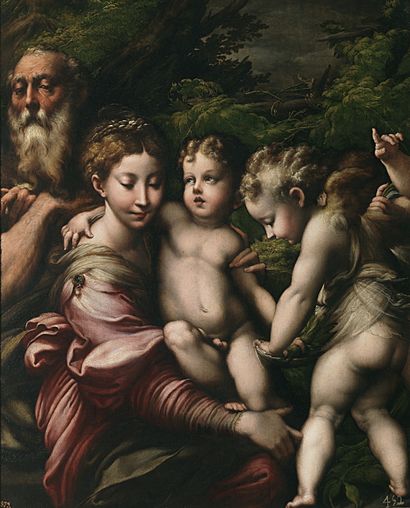Holy Family with Angels (Parmigianino) facts for kids
Quick facts for kids Holy Family with Angels |
|
|---|---|
 |
|
| Artist | Parmigianino |
| Year | c. 1524 |
| Medium | Oil on panel |
| Dimensions | 110 cm × 89 cm (43 in × 35 in) |
| Location | Museo del Prado, Madrid |
The Holy Family with Angels is a famous painting created around 1524 by an Italian artist named Parmigianino. This beautiful artwork is made with oil paints on a wooden panel. You can see it today at the Museo del Prado in Madrid, Spain.
Contents
About the Painting
This painting shows a scene from the Bible. It features the Holy Family, which includes Mary, Joseph, and the Christ Child. Angels are also part of the scene. The painting is known for its skillful design and careful details.
What Does It Show?
In the painting, you can see Mary with the baby Jesus. Jesus is reaching out to take fruit from an angel's lap. There is also an older man with hairy arms in the picture. This man is usually thought to be Saint Joseph. The way Parmigianino painted the figures and their expressions makes the artwork very special.
Who Painted It?
The artist, Parmigianino, was an Italian painter during the Renaissance. His full name was Girolamo Francesco Maria Mazzola. He was known for his unique style, which often featured elegant, elongated figures. He created this painting just before he moved to Rome.
A Journey Through Time
This painting has a long and interesting history. It is believed to be the "large painting" that the famous writer Giorgio Vasari mentioned. Vasari wrote about artists of his time. He said Parmigianino made this painting with great skill.
The painting was first given to Pope Clement VII. He then gave it to Ippolito de' Medici, an important cardinal. By the early 1600s, the artwork was in Madrid. It was part of the art collection of Pompeo Leoni, a well-known sculptor. After Leoni passed away in 1608, his collection was divided. Eventually, the painting found its home in the Museo del Prado.
Other Versions and Studies
Because this painting is so famous, other artists made copies of it. One early copy used to be in a church called San Quintino in Parma, Italy. Now, you can find that copy at the Rocca di Fontanellato.
Artists often make practice drawings before they create a big painting. These are called "preparatory studies." There is a drawing by Parmigianino for this painting that is now in the Louvre museum in Paris. This drawing shows some differences from the final painting. It helps us understand how the artist planned his work.
See also
 In Spanish: La Sagrada Familia con ángeles (Parmigianino) para niños
In Spanish: La Sagrada Familia con ángeles (Parmigianino) para niños

